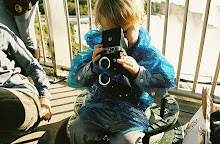 "For it is what is what happens between people, Brecht insists, that provides them with all the material they can discuss."
"For it is what is what happens between people, Brecht insists, that provides them with all the material they can discuss." Jameson
Dear Jonas,
You don't like it if someone on the street doesn't smile at you. In the rare event that this happens, you crane your neck around and stare them down. Your favorite thing to do right now is to push your own stroller. You enjoy doing this so much that it has begun to impair our trips to the park and back. When we're about halfway home, you start squirming and stare me down until i take you out and let you "walk." Every so often you sit down for a second and then either start pushing again or take off in an exuberant crawl down the sidewalk. i chase you down, reposition you behind the stroller, and we try it again. This goes on for a city block or two, then you're back in the stroller with black fingertips and dusty knees. Yesterday some men driving by on Metropolitan Ave. yelled at us, "You better wash his hands." i was so thankful for that. i'm sure i never would've thought to do it otherwise.
Tonight our friends Jimmy and Borcu came over and sat with you so your Dad and i could go see a movie. You were already asleep when they got here. i wonder if you had any notion that we were gone? We met at Union Square and walked down to Film Forum for the first time since shortly before i had you. On that last trip, we saw
Encounters at the End of the World. While we were waiting for the film to start, your Dad told you about the director, Werner Herzog, and he explained what he thought the film would be about.
We went to see
The Headless Woman, an eerie, mesmerizing Argentinean film by the director Lucrecia Martel. The plot gestates around the asphyxiating moral ambiguity of Vero, a wealthy and well-connected dentist, aging beauty, and mother of grown children. Vero hits and kills a child (so we think--it is crucial to the film's order that we are never 100 percent positive on this) and a dog as she answers her cell phone while driving down a dusty country road. Out of this event, the film makes good on its title's promise of the bizarre ways that class and gender can bewitch subjectivity. Her disconnection to her pre-accident world at first seems to be the result of a head injury sustained during the crash, but as the days pass, her actions reveal her to be more present than we expect, and her inability to proceed normally exposes itself as at least equal parts emotional and physical trauma. As she realizes that the men in her life are not only hiding from her what they have uncovered about the event, but have also erased all evidence of her crime, she dies her platinum hair black--a silent nod of complicity with their plans. The film refuses to verify what actually happened, and Vero's deed is never legally punished. Its riveting narrative rhythm elicits a sympathetic character from a repulsive act of careless class privilege, the viewer is forced to let this small part stand in for the much larger impasses of history. How many times, and in how many ways, is this process repeated, and what is lost in the transaction?



